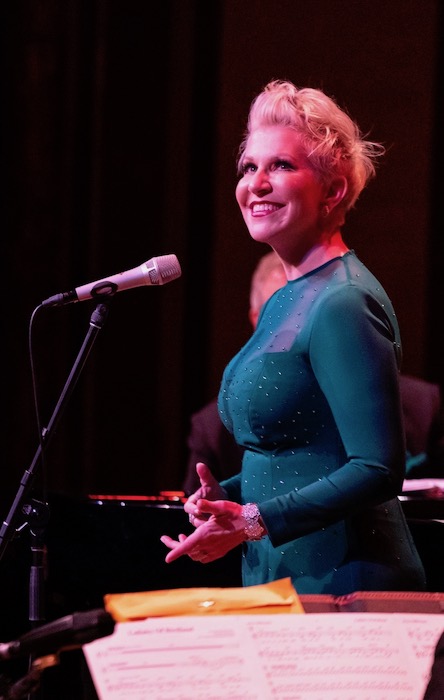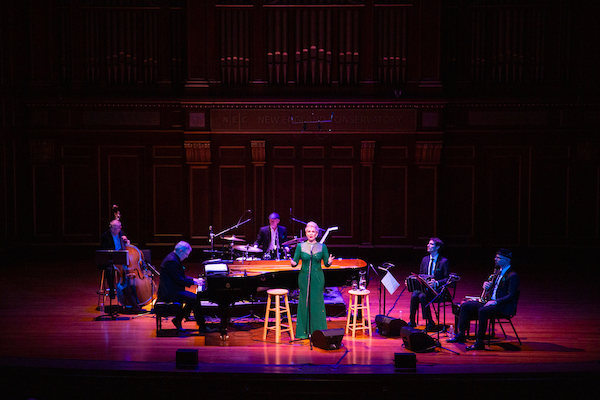Jazzy Joyce: Genres merge delightfully in DiDonato’s Boston recital
Anyone who has taken voice lessons will recall the first excitement of opening the Twenty-Four Italian Songs and Arias, the yellow-bound collection that introduces students to the world of Baroque and Classical repertoire.
But as years of lessons and college recitals continue, this music can become stale for performers and audiences alike. Fortunately, Joyce DiDonato has breathed new life into such music through SONGPLAY, a vivid exploration of her own journey as a singer.
Heard in her much-anticipated Boston recital debut with the Celebrity Series Friday night at Jordan Hall in Boston, SONGPLAY seeks to recapture the sense of adventure the American mezzo-soprano first encountered as a voice student years ago. Reimagined as jazz standards, these familiar Italian songs sounded strikingly fresh and convincing, a testament to what well-worn standards can become when viewed through a new lens.
Pianist Craig Terry arranged the program and its accompanying album, connecting songs by Giordani, Caccini, Marcello, and Paisiello with those from the American songbook. Improvisation, a trait of both Baroque and jazz music, ties it all together.
For a singer who has made her mark with Handel, Mozart, and Rossini opera roles, DiDonato is in somewhat uncharted territory here. But she approached each song with the smooth sophistication of a veteran crossover artist. She shaped the music with subtle dynamics, and her lines coursed vibrantly, with delicate trills adding fire and intensity. As the jazz elements took over—sometimes mid-tune—she varied and colored her phrases with light scoops, glissandos, and the occasional Louis Armstrong growl.
Friday night, DiDonato was a first among equals, and her accompanying quintet delivered bounce and quiet intensity to each selection. With Terry as accompanist, Giordani’s popular “Caro mio ben” took on lush, bluesy harmonies as it unfolded. Giulio Caccini’s “Amarilli, mia bella,” brought bassist Chuck Israels into the mix, moving in a bright swinging style.
Alessandro Parisotti’s “Se tu m’ami” was transformed into a pulsing bossa nova as trumpeter Charlie Porter, playing a Monette instrument, answered DiDonato’s phrases with nimble lines of his own. With bandoneonist Lautaro Greco, the band infused the waltzing rhythms of Benedetto Marcello’s “Quella fiamma” with rippling Latin flavor.
Treating each of the popular ballads as miniature dramatic scenes, DiDonato mined the subtle passions of George Shearing’s “Lullaby of Birdland.” “Will he like me” from Jerry Bock and Sheldon Harnick’s 1963 musical She Loves Me was coy and innocent. So too was Duke Ellington’s “Solitude,” which the singer shaded in warm, plush tones. In all the selections, drummer Jimmy Madison provided rhythms that were felt as much as heard.
Gene Scheer’s “Lean Away” proved the evening’s highlight. Best known as a librettist (he supplied the adaptation for Jake Heggie’s successful opera Moby-Dick), Scheer writes songs that recall the lyrical sweep of Gershwin. DiDonato and company offered his sweet-toned “Lean Away” as a loving memorial to André Previn, who died Thursday morning.
The instrumental numbers that peppered the program showcased the powers of DiDonato’s band. Greco’s performance of Enrique Delfino’s Griseta ebbed and flowed, the dissonances from his bandoneon tingling the ear. Porter played with radiant Dixieland and gnarly Hard Bop styles in Isham Jones’ “There is No Greater Love,” arranged for trumpet, bass and drums (a replacement for Porter’s Prologue solo). Terry took the spotlight for Zez Confrey’s Dizzy Fingers, its blazing figures taking the pianist all over the keyboard.
Two encores brought additional pleasures. “Col piaser della mia fede” from Vivaldi’s Arsilda, regina di Ponto, which featured DiDonato and Porter in gleaming musical dialogue, flowered into a Bebop groove. The melody of Édith Piaf’s “La Vie en Rose,” rendered as a smooth jazz number, seemed to glowed like faint moonlight.
“I promise I won’t quit my day job,” DiDonato joked before delving into Piaf’s song. But the versatility and vision of SONGPLAY shows that she has a keen eye for successful new projects and musical exploration.
Joyce DiDonato will repeat SONGPLAY 8:30 p.m. Monday at Lincoln Center’s Appel Room.

